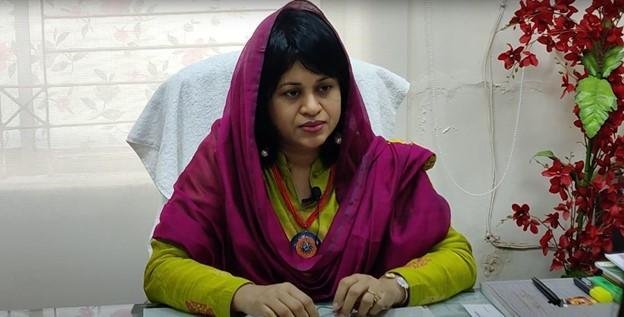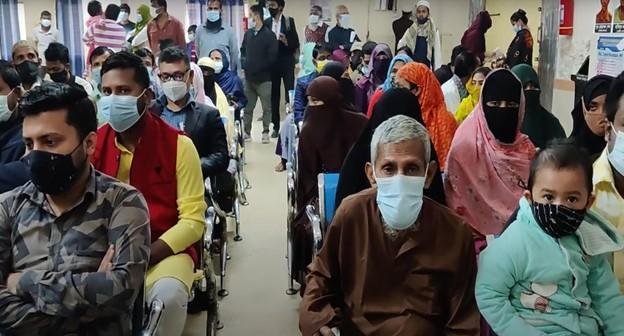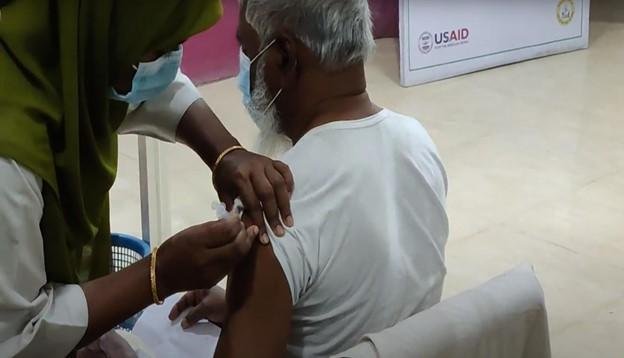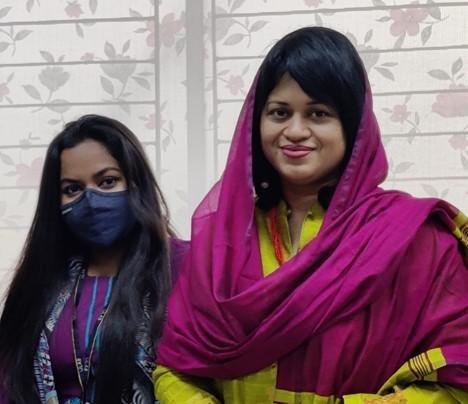Task: Producing an interview based field report
Course Code and Name: MSJ3151 News Sourcing and Gathering
Project Name: No alternative for adhering to hygienic regulations: Dr. Ayesha
Project Date: Fall 2021
Project Type: Group
Project Completed on Semester No: 06
CI Theme of the Term: Language as a Weapon
Project Description:
This group project involved an in-depth interview-based feature focusing on the importance of adhering to hygienic regulations during the COVID-19 pandemic, particularly in the context of the Omicron variant. The feature was centered on an interview with Dr. Ayesha Akhter, the Assistant Director of the 250-bed E-TB hospital in Shyamoli, Dhaka. The report highlighted the evolving challenges of the pandemic, including the rapid spread of Omicron and the critical role of hygiene and vaccination in controlling the virus. The project also examined the broader implications of health communication, using language as a tool to inform and persuade the public about the necessity of following health guidelines.
Project Justification:
The project was justified by the pressing need to address public health concerns during the ongoing pandemic, especially with the emergence of the Omicron variant. Given the rapid spread of Omicron and the increasing number of cases in Bangladesh, it was crucial to raise awareness about the importance of adhering to hygienic practices and getting vaccinated. By interviewing a medical professional actively involved in pandemic management, the project aimed to provide accurate and timely information to the public, reinforcing the message that there is no alternative to following health regulations in mitigating the impact of the virus.

DEPARTMENT OF MEDIA STUDIES AND JOURNALISM
Course Name: News Sourcing and Gathering
Course Code: MSJ11321
Term: Fall 2021
Section: 01
Final Assignment: Interview Based News Report
Submitted To
Mahmudun Nabi
Senior Lecturer
School of Social Science (SSS)
Department of Media Studies and Journalism
University of Liberal Arts Bangladesh (ULAB)
Delivered By
Zakia Sultana Sanam (201012045)
Yuvraj Sen (191012020)
Date of Submission: 31. 01. 2022, 11:59 PM
NO ALTERNATIVE FOR ADHERING TO HYGIENIC REGULATIONS: DR. AYESHA
Zakia Sultana Sanam, Dhaka
Monday, January 31, 2022, 6:30 PM

“We were in a good position in the Corona scenario, but Omicron is swiftly spreading worldwide,” Dr. Ayesha Akhter remarked in an interview at the 250-beded E-TB hospital, Shyamoli, yesterday.
Two years have passed since the coronavirus outbreak. Bangladesh has implemented many health measures, including lockdowns in several steps, commencing in the first year of the pandemic in March 2020. During the second week of December last year, outbreaks appeared to be worsening. Since then, several more Corona varieties have emerged along with the current Omicron variety.
The death rate is increasing in lockstep with the spread of coronavirus across the country. As a result, 31 people have died and 13,120 new cases have been identified in the last 24 hours of 31 January. The number of deaths each day has hit an all-time high in the past four months. On September 22, 36 individuals were reported dead in Corona in a single day.
Researchers from all over the world are studying the numerous forms of coronavirus and their properties. According to a new study by Japanese scientists, Omicron, which is still the subject of several studies, may live longer than its predecessor, the Delta variant. The virus can survive for up to 7 days on plastic and nearly 21 hours on human skin.
According to the United Nations, Omicron has spread to 128 countries worldwide. Infections of this nature are also on the rise in India. Furthermore, this virus is on the rise in Bangladesh. It has infected roughly 15% of the population in this country.
Dr. Ayesha Akhter, who has worked for Corona patients since the outbreak began, said, “Omicron spreads rapidly, and the signs and symptoms vary from person to person. However, symptoms like a sore throat, cough, and a mild temperature are possible. Other signs and symptoms include weariness and a loss of smell. However, the infected person may recognize the symptoms in many circumstances, yet this is not always the case.”

According to Worldometers, a website that publishes updated figures on the number of people infected, dying, and recovering from the disease since the start of the Corona epidemic, the total number of infected people in the world increased to 375,397,834, and the total number of deaths in Corona increased to 5,682,232, where recovered cases are 296,649,469 on Monday, January 31. According to Dr. Ayesha Akhtar, “Omicron spreads faster than other Corona variations. As a result, the infection rate is significant. However, Omicron has a lower death rate than Delta.”
Bangladesh began delivering booster dosages in the last week of December 2021. Initially, adults over the age of 60 were given booster doses as part of the booster dosage program. The government, however, is now distributing booster doses to people starting from the age of 40. According to Dr. Ayesha Akhter, “The elderly are the most vulnerable. If the elderly become infected, their chances of recovery are low, thus a booster dose is given to them earlier.” Those that serve directly as front-line warriors, such as journalists, police, physicians, nurses, and corona workers, are also given booster doses initially, according to her.

“We are prepared for this after last years’ experience with delta infections. It is crucial, however, for individuals to be aware because if the rate of infection increases, it is apparent that a crisis in the ICU bed is imminent. Everyone must be vaccinated, and the government’s health laws must be followed at the same time” Dr. Ayesha Akhtar remarked in response to the question of whether Bangladesh is ready for the new infectious Omicron.
Dr. Ayesha Akhtar also added “Our primary responsibility, regardless of the type of attack, is to adhere to cleanliness guidelines. Although Omicron-related deaths are rare, they should not be neglected. We will be able to deal with Omicron considerably in a more effective way if we follow the council’s 11-point hygiene laws and the health department’s 15-point hygiene requirements. People are growing more interested in vaccines after initially being uninterested, making it easier to vaccinate them. Omicron can be controlled if everyone is vaccinated and follows sanitary standards. Any virus, regardless of its undiscovered variety, will be forced to surrender to us if the hygiene standards are maintained properly.”
The world’s first corona patient was diagnosed in Wuhan, Hubei Province, China, in December 2019. Corona’s first death happened in China, just after the deadly virus began to spread swiftly over the globe. On January 20, 2020, the World Health Organization – WHO announced a state of emergency to handle the problem. However, because things didn’t get any better, the World Health Organization declared Corona an epidemic on March 11 of that year.
Photo of the interviewee and interviewer:

Interview questions:
- What are some of the signs and symptoms of Omicron? Is it similar to other Coronavirus variations or distinct from them?
- How severe is the Omicron variant? How much is the Omicron variant risky in the context of Bangladesh?
- Omicron is currently harming the youth; yet, why are booster doses being provided to individuals over 50-60 instead of the young generation?
- What can Bangladeshi doctors do to stop Omicron from spreading further and what is the procedure to ICU patients if Omicron transmission rises in the country?
- What are the advantages of a booster dose? Why is it necessary to administer a booster dose?
- When will booster doses be given to the general public, including the younger population?
- Our neighboring countries have already begun to implement lockdown as a result of Omicron. However, no government decision on the lockdown problem has been made in our country. What government decisions can be made, and what steps do you think should be taken, now that Omicron’s impact is growing?
- How much should those who aren’t getting booster doses be aware of Omicron?
Learnings and Outcomes (Self-reflection):
- Understood the importance of accurate and timely information dissemination during public health crises.
- Gained experience in conducting interviews with healthcare professionals and translating complex medical information into accessible language.
- Developed skills in collaborative journalism, working effectively within a team to produce a comprehensive news report.
- Enhanced the ability to handle sensitive topics, ensuring that the information presented was both factual and empathetic to the concerns of the public.
- Learned the significance of adhering to ethical journalism practices, particularly in the context of health reporting during a pandemic.